EQUINE WELFARE NETWORK PROFILE
New Day Equine Therapy
https://newdayequinetherapy.com

New Day Equine Therapy
14372 Blunts Bridge Rd.
Ashland, VA 23005
Mailing Address:
1510 Floyd Ave
RICHMOND, VA 23220
Phone: 804-307-5156
MAKE AN INQUIRY
View our WEBSITE
EIN: 83-2767154Founded: 2018
Profile Last Updated December 30, 2025
Public Charity
MISSION & PROGRAMS
Mission:Our mission is to enhance the quality of life and overall well-being of cancer patients, survivors, and their families through equine therapy. Equine-assisted services are provided primarily to children and adults affected by cancer and/or autism through interactions with equines.
Our organization conducts Equine Assisted Services in accordance with the EQUUS Foundation Guidelines on Qualifications of Organizations Conducting Equine Assisted Services (EAS).
Our organization provides outreach and/or public education programs involving horses.
100% of our total programs and services are equine-related.
Our organization relies on other organization(s) for the care and shelter of equines involved in our programs.
Our organization does not CURRENTLY use satellite, overflow, foster, and/or outreach facilities.
Please describe what steps your organization takes to ensure that:
1) all interactions between your equines and people are mutually beneficial and conducted in accordance with the Guidelines for Human-Equine Interactions stated below;
2) all equines in the care of our organization and/or equines that participate in the organization's program have access to clean drinking water at all times; nutritious food in sufficient quantity, including natural forage such as pasture grass and/or hay; appropriate veterinary, farrier, and dental care; shelter and protection from the weather; sufficient safe space to move around comfortably on a daily basis; and daily opportunity to freely interact and have contact with other equines:
1) Equines are evaluated for emotional and physical soundness each morning when they are brought in from their pastures for their morning meal. They are evaluated again during the grooming and tack up process. Once in the riding ring and before mounting, they are observed at walk and trot by the PATH instructor. If signs of emotional stress or physical injury are present, the PATH instructor has unrestricted authority to remove the equine from participation.
On average, an equine’s participation in New Day’s therapeutic riding program is limited to one, thirty-minute lesson per day. Equines are ridden in bitless bridles and are led at walk/trot by a volunteer under the supervision of the PATH instructor who is experienced in equine first aid.
New riders in New Day’s program first receive instruction on equine handling, grooming, leading and observation of body language.
As noted elsewhere in New Day’s profile, our Director and PATH Instructor, Bruce Nachman, is the owner of the equines used in our program. Bruce has over 40 years of experience in the equine industry. He utilizes his extension knowledge to select which equines have suitable temperaments for, and are willing participants in, our therapeutic program.
Equines participating in New Day’s program are lavished with affection by both riders and volunteers. They are indulged with carrots and apples. A frequent comment is that our horses are living their best lives.
(2) All equines that participate in New Day Equine Therapy’s programs have 24 hour access to clean drinking water both in their stalls and pastures. They are provided two nutritious, individualized meals daily. At all other times they have access to hay or natural forage.
All equines receive farrier care on the second Thursday of each month. They also receive regular and appropriate veterinary/dental care as recommended by the attending professionals. Health professionals are also contacted as necessary to address the needs of an individual equine.
All equines spend a minimum of 16 hours per day in large pastures with their equine herd. Protection from weather is provided via run-in shed, barn roof overhangs and trees. In the event of extreme weather, equines are sheltered in their stalls.
Equine Assisted Services (EAS) Overview:
Overview of our programs involved with providing EAS to individuals with special needs:
New Day Equine Therapy is a 501(3)(c) non-profit, based in Ashland, Virginia, which provides therapeutic mounted and unmounted services to cancer patients, survivors, and their families. Executive Director and Instructor Bruce Nachman is a Professional Association of Therapeutic Horsemanship (PATH) Certified Instructor and brings over 40 years of horsemanship experience to the program.
For each student, Nachman develops an individualized lesson plan catered to the needs and confidence of the rider. Lessons begin with ground-based interaction with horses, progressing with the student’s interest to traditional mounted lessons in the ring. In each lesson, students complete mounted exercises focused on both gross and fine motor skills, hand-eye coordination, and mental stimulation.
Equine Assisted Services (EAS) and Providers:
Our organization provides the following Equine Assisted Services (EAS):
Adaptive/Therapeutic Riding
Adaptive/Therapeutic Unmounted Horsemanship
1: Total number of Equine Assisted Service Providers at New Day Equine Therapy
1 Bruce D. Nachman
FACILITY PARTICIPATION:
New Day Equine Therapy
RELATIONSHIP: Independent Contractor
SERVICES PROVIDED:
Adaptive/Therapeutic Riding
Adaptive/Therapeutic Unmounted Horsemanship
DEGREES, LICENSES AND/OR CERTIFICATIONS
PATH CTRI
Outreach and/or Public Education:
New Day routinely reaches out to the local higher education facilities, businesses and cancer organizations. This has resulted in volunteer opportunities for the surrounding communities as well as opportunities for cancer support groups to visit the New Day facility and be introduced to the horses and their care.
Research/Medical Use of Equines:
Our organization has never made, and would not ever consider making, equines available for research studies or medical training that involves invasive procedures and/or that which may cause pain or suffering to the equine.
Religious Affiliation:
Our organization does not promote religious education, religious purposes, or a specific religious faith or use donations for religious education or religious purposes; require participants to be of a certain faith; require participation in religious, instruction, activities or services; or require participation in prayer, worship, religious instruction or other religious activities as a condition of receiving social or secular services offered.
Auction Donation:
Our organization has never allowed, or would not consider allowing, an equine to be sold, transferred, released, or otherwise placed into possession of any person or organization that would cause or allow the equine to be sold at auction for slaughter.
POLICIES: INTAKE, ASSESSMENT & TRAINING
Prior to a horse being accepted and/or arriving at the facility, the organization has the following policies in place:The owner of a potential equine is interviewed over the phone or in person prior to seeing the equine
The equine is evaluated at its place of residence
The owner completes an application/contract which constitutes the agreement between the owner and our organization when the equine is acquired from the equine's owner other than by seizure or by abandonment
The owner is financially responsible for the shipping of the equine to and from the organization
If health records are not available or are out-of-date, our veterinarian will administer appropriate vaccinations
Not Checked:
A health certificate signed by a veterinarian and dated no more than seven days prior to arrival is provided to our organization either prior to or upon arrival of the equine attesting to the health status of the equine
A health certificate signed by a veterinarian and dated no more than seven days prior to arrival is provided to our organization either prior to or upon arrival of the equine attesting to the health status of the equine
Trial Period: Check all that apply:
Equines are on trial for up to 30 days
The trial period may be reduced based on the equine's progress
During the trial period, the organization accepts total financial responsibility for the care of the equine, including board, feed, shoeing and any necessary veterinary care
During the trial period, the organization accepts financial responsibility for the care of the equine, including board, feed, shoeing and any necessary veterinary care, up to a fixed amount agreed upon by the organization and the owner
The trial period may be terminated by either the organization or the owner for any reason
Not Checked:
Equines are on trial up to 60 days
Equines are on trial for 60 or more days
During the trial period, the owner/donor is financially responsible for the care of the equine, including board, feed, shoeing and any necessary veterinary care
Equines are on trial up to 60 days
Equines are on trial for 60 or more days
During the trial period, the owner/donor is financially responsible for the care of the equine, including board, feed, shoeing and any necessary veterinary care
Upon intake, the organization has the following quarantine policy in place:
The equine is confined to a designated and separate area for isolation and quarantine at the facility for a prescribed period of time
Not Checked:
The equine is confined to a designated and separate area for isolation and quarantine off-site for a prescribed period of time
The equine is not quarantined
The equine is confined to a designated and separate area for isolation and quarantine off-site for a prescribed period of time
The equine is not quarantined
The typical length of quarantine is: Up to 10 days
Following arrival of the equine at the facility, the following is performed:
Physical examination to include temperature, pulse and respiration by a trained staff member upon arrival
A Henneke Body Conditioning Score or other body conditioning score is assigned by a trained staff member upon arrival
Photographs are taken of each equine upon arrival at the facility and kept with the equine's health records
Physical examination by a farrier
Physical examination by a dentist
Not Checked:
Physical examination to include temperature, pulse and respiration by a veterinarian upon arrival
A Henneke Body Conditioning Score or other body conditioning score is assigned by a veterinarian upon arrival
The equine is microchipped if the equine has not been microchipped
Physical examination to include temperature, pulse and respiration by a veterinarian upon arrival
A Henneke Body Conditioning Score or other body conditioning score is assigned by a veterinarian upon arrival
The equine is microchipped if the equine has not been microchipped
Horses are assessed for following skills and behaviors:
Retrieval from a pasture/paddock
Leading with a halter and lead rope
Temperament, disposition and attitude, such as rated from very calm to very high spirited
Saddling
Bridling
Loading onto and unloading off a trailer
Mounting and dismounting
Riding at the walk
Riding at the trot
Riding at the canter
Riding by a beginner and/or unbalanced rider
Tolerance to unusual objects and loud noises
Known vices, i.e., cribbing, biting, kicking, weaving, stall walking, etc
Grooming
Bathing
Clipping
Tolerance to multiple handlers at the same time
Not Checked:
Lunging
Jumping
Driving (Pulling a carriage)
Lunging
Jumping
Driving (Pulling a carriage)
Our organization has the following policies and procedures in place pertaining to the ongoing assessment of horses in its care:
Physical examination by a veterinarian at least annually
The Henneke Body Condition score or other body conditioning score is updated at least annually by the veterinarian
Vaccinations are administered at least annually
Photographs are taken of each equine annually and kept with the equine's health records
Equines at our facility may be treated by an equine chiropractor
Equines at our facility may be treated by an equine acupuncturist
Equines at our facility may be treated by an equine massage therapist
Equines at our facility may be treated by an equine nutritionist
Not Checked:
The Henneke Body Condition score or other body conditioning score is updated at least annually by a trained staff member
Photographs are taken of each equine monthly and kept with the equine's health records
The Henneke Body Condition score or other body conditioning score is updated at least annually by a trained staff member
Photographs are taken of each equine monthly and kept with the equine's health records
Our organization has the following policies and procedures in place pertaining to the weight-carrying or workload capabilities of horses/equines that are ridden in our care:
Our organization evaluates the weight-carrying and workload limitations for each equine that is ridden at least annually
Our organization maintains a written record of the weight-carrying and workload limitations for each equine that is ridden
Not Checked:
Our organization does not evaluate the weight-carrying and workload limitations for each equine that is ridden
No equines are ridden; not applicable
Our organization does not evaluate the weight-carrying and workload limitations for each equine that is ridden
No equines are ridden; not applicable
The following variables are considered in determining the weight-carrying and workload limitations for each equine that is ridden:
Equine age, weight, breed, body condition, fitness, balance, health and soundness
Equine conformation to include the top line, length of back, strength and width of loin, bone density (measured by the circumference of the cannon bone just below the knee)
Size, shape, condition and angle of the hooves
Participant weight, height, body proportions, balance, fitness and riding skills as well as behavioral issues and safety concerns
Weight and proper fit of the saddle and other equipment
Terrain and footing in the working environment
Duration and frequency of working sessions, as the frequency with which an equine is subjected to maximum weight carrying and/or workload
Nature and pace of work, repetitive or varied, radius of turns, degree of incline and regularity of footing when equine is subject to maximum weight-carrying capacity
Temperature and/or weather conditions
Seasonal impact on the equines' workload and weight-carrying capabilities and limitations
Not Checked:
Our organization does not evaluate the weight-carrying and workload limitations for each equine that is ridden
No equines are ridden; not applicable
Our organization does not evaluate the weight-carrying and workload limitations for each equine that is ridden
No equines are ridden; not applicable
Horses provided formal training (groundwork or riding): Daily
Additional information about our intake, assessment & training policies and practices:
New Day Equine Therapy leases horses, which are housed at a shared facility. The facility is responsible for the care of the horses, only intakes horses from known dealers, and performs an assessment of the horses prior to arrival.
POLICIES: BREEDING
The organization has the following policies related to breeding and stallions:Our organization does not conduct breeding of equines owned or under the care of our organization.
The main facility where our organization conducts its programs does NOT breed equines.
Not Checked:
One or more of the facilities where our organization conducts its programs, including foster/temporary care facilities, breeds equines
One or more of the facilities where our organization conducts its programs, including foster/temporary care facilities, are permitted to house stallions
One or more of the facilities where our organization conducts its programs, including foster/temporary care facilities, breeds equines
One or more of the facilities where our organization conducts its programs, including foster/temporary care facilities, are permitted to house stallions
POLICIES: EUTHANASIA
The organization has the following policies related to euthanasia:Our organization will never have an equine euthanized for space
Our organization will have an equine euthanized upon the recommendation of the veterinarian if the equine is a threat to itself, other equines, or people
Our organization will have an equine euthanized upon the recommendation of the veterinarian after all reasonable treatment options have been explored
Euthanasia is done on site when possible to decrease trauma from transport
Disposal of the carcass is handled within 24 hours
Not Checked:
Our organization will never have an equine euthanized under any circumstances
Euthanasia is done at the veterinarian's facility
Our organization will never have an equine euthanized under any circumstances
Euthanasia is done at the veterinarian's facility
The following are authorized to administer the procedure for your organization in accordance with state laws:
Veterinarian
Not Checked:
A certified euthanasia technician
Senior staff with appropriate training
Employee of animal control shelter or humane society with appropriate training
Veterinary student under the supervision of a licensed veterinarian
Not applicable. Our organization prohibits euthanasia under any circumstances
A certified euthanasia technician
Senior staff with appropriate training
Employee of animal control shelter or humane society with appropriate training
Veterinary student under the supervision of a licensed veterinarian
Not applicable. Our organization prohibits euthanasia under any circumstances
Additional information about our euthanasia policies and practices:
New Day Equine Therapy leases the horses used in its equine assisted services program. The leasing facility adheres to the euthanasia policies and practices noted above.
POLICIES: RE-HOMING
Re-homing Agreement not applicable.Our organization has the following re-homing (adoption/purchase) policies and procedures in place:
Our organization does not have the authority to transfer ownership and/or does not own any of the equines involved with our programs.
Our organization has the following policies and procedures related to horses that need to be retired, are no longer able to contribute to the mission of the organization, and/or are no longer manageable:
Our organization does not have the authority to transfer ownership and/or does not own any of the equines involved with our programs.
Equines may be returned to their owners
In the case an equine is unmanageable and demonstrates repeated dangerous behaviors, the equine may be euthanized upon the recommendation of the veterinarian
In the case an equine is unsound and/or unhealthy and cannot be treated to relieve suffering, the equine may be euthanized upon the recommendation of the veterinarian
Not Checked:
Equines may remain at our organization for their lifetimes
Equines may be found suitable homes by our organization
Equines may be sent to auction
If a suitable home cannot be located within 12 months, the equine may be euthanized
The organization will accept financial responsibility for equines in the current care of the organization that need to be retired or are no longer able to contribute to the mission of the organization if all alternatives have been explored to find the equine an appropriate placement and space is not available for the equine to remain at the organization.
Equines may remain at our organization for their lifetimes
Equines may be found suitable homes by our organization
Equines may be sent to auction
If a suitable home cannot be located within 12 months, the equine may be euthanized
The organization will accept financial responsibility for equines in the current care of the organization that need to be retired or are no longer able to contribute to the mission of the organization if all alternatives have been explored to find the equine an appropriate placement and space is not available for the equine to remain at the organization.
Additional information about our rehoming policies and practices:
New Day Equine Therapy leases the horses used in its equine assisted services program.
EQUINE CARE & SHELTER/FACILITY INFORMATION
Our organization does not CURRENTLY use satellite, overflow, foster, and/or outreach facilities.Total facilities at which our organization cares for and shelters horses used in our programs: 1
New Day Equine Therapy
14372 Blunts Bridge Road Ashland VA 23005
Currently operational
Total number of horses/equines currently involved with your programs, under your care, and/or owned by your organization at this facility: 7
Total number of horses at this facility NOT INCLUDING those counted above: 5
Maximum capacity of horses at this facility: 15
Does your organization own, lease or use a part of this facility? Lease
Provide the contact information for the individual or organization responsible for investigating abuse in the county where the facility is located, including mailing address, email address, and phone information.
Hanover County Animal Control 12471 Taylor Complex Ln, Ashland, VA 23005 (804) 365-6485 ctyadm@hanovercounty.gov
Does your organization conduct Equine Assisted Services (EAS) at this facility in accordance with the EQUUS Foundation Guidelines on Qualifications of Organizations Conducting Equine Assisted Services (EAS)? Yes
Total number of Equine Assisted Service Providers AT THIS FACILITY, including instructors, specialists, therapists, counselors, coaches and/or facilitators (full-time, part-time, volunteer, independent contractors, and/or providers accompanying clients) that conduct Equine Assisted Services (EAS) in accordance with the EQUUS Foundation Guidelines on Qualifications of Organizations Conducting Equine Assisted Services (EAS) AT THIS FACILITY: 1
Equine Assisted Service Providers Assigned to this Facility: (see Equine Assisted Service Provider Section below for details)
1. Bruce D. Nachman
ADDITIONAL INFORMATION ABOUT THIS FACILITY:
Any breaches in pasture fencing are easily visible from most areas of the property and are immediately repaired. A more detailed inspection is conducted monthly to identify areas where failure might occur and immediately repaired.Veterinarian Information: New Day Equine Therapy (*Main) Currently operational
Veterinarian: Douglas K. Daniels and Shawn Devaney
Clinic Name: Virginia Equine LLC
1994 Shallow Well Rd
Manakin-Sabot VA 23103
Phone: 804-784-5419
Grounds: New Day Equine Therapy (*Main) Currently operational
Total acreage dedicated specifically to the horses: 30
Our organization has use of the following at this facility:
Structures/Barns: 2 Run-in sheds: 1
Pastures: 4 Paddocks/Pens/Turnout Areas: 1
Uncovered Outdoor Rings: 1 Covered Outdoor Rings: 0 Indoor Rings: 0
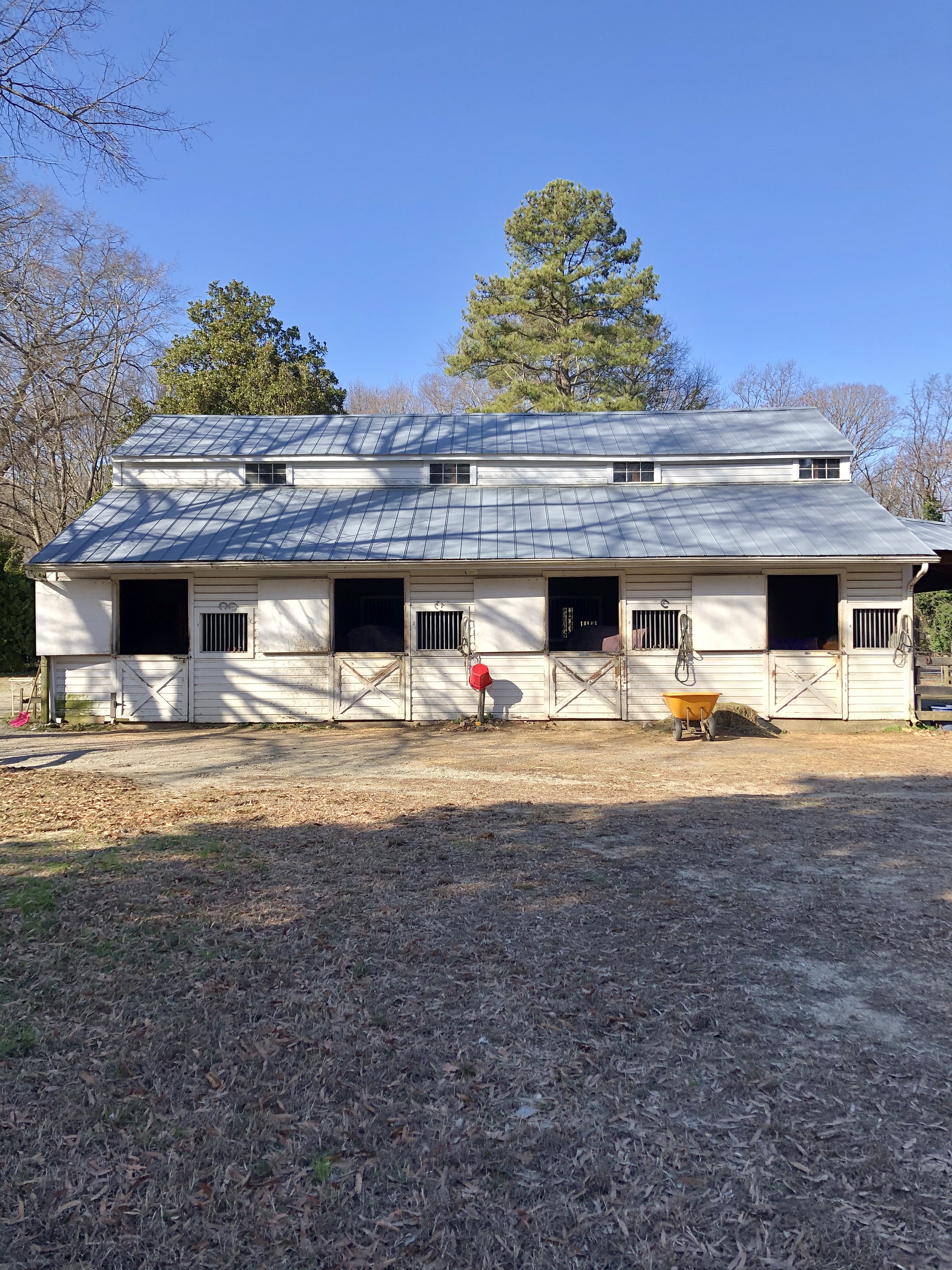
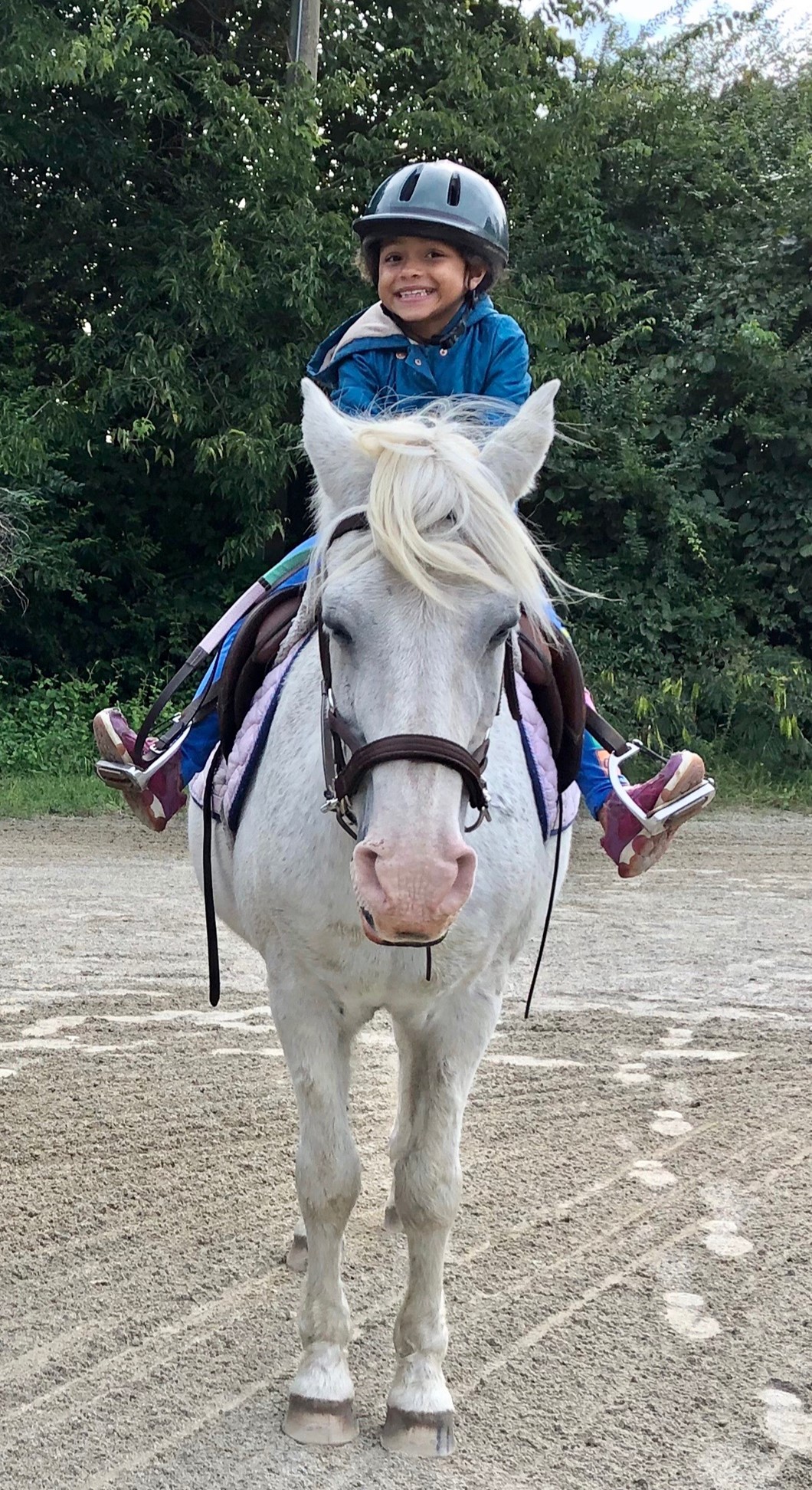
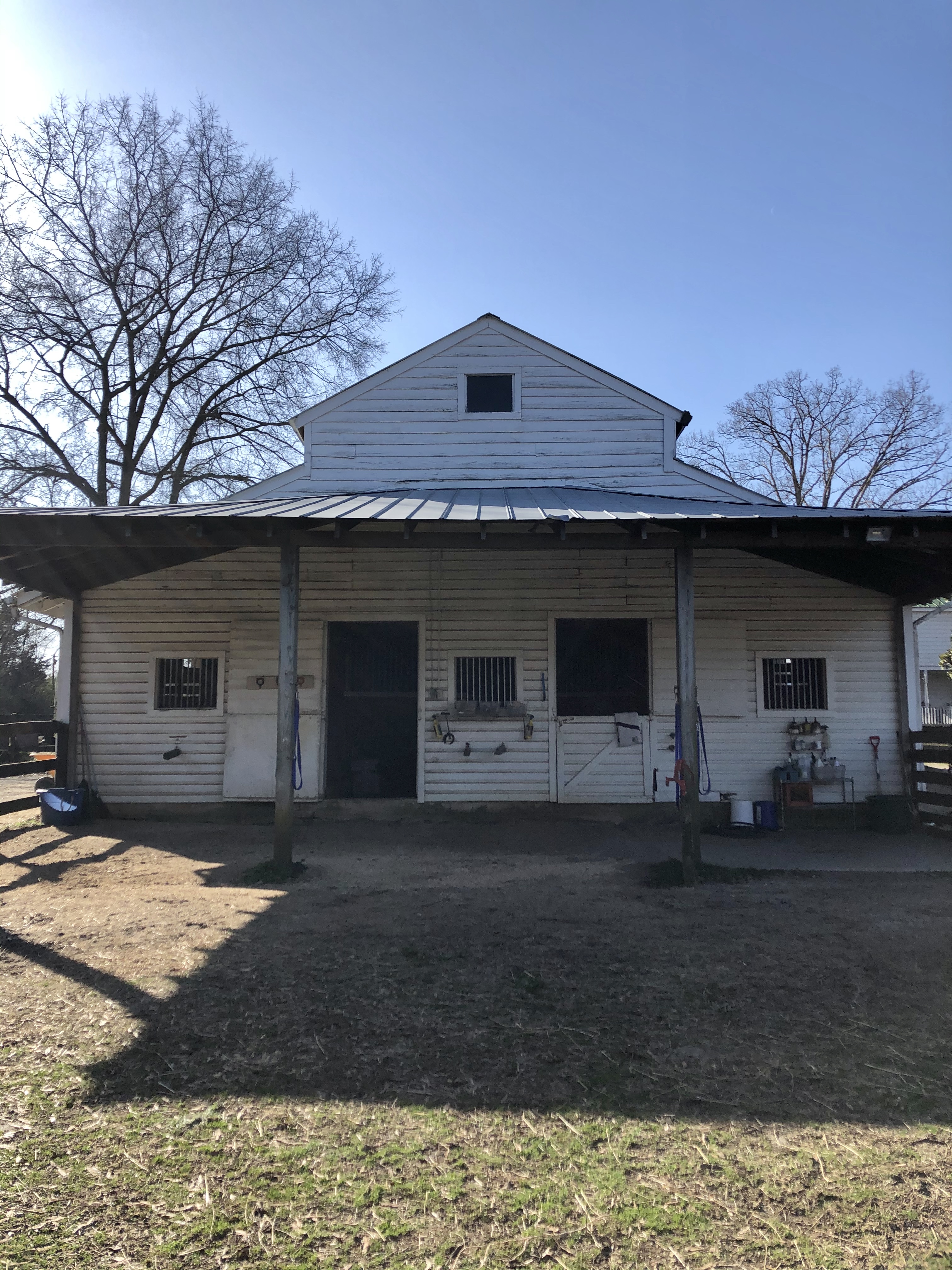
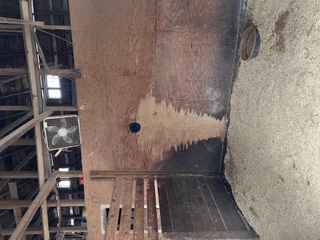
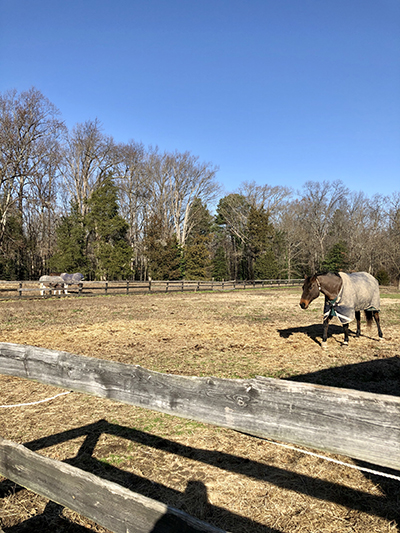
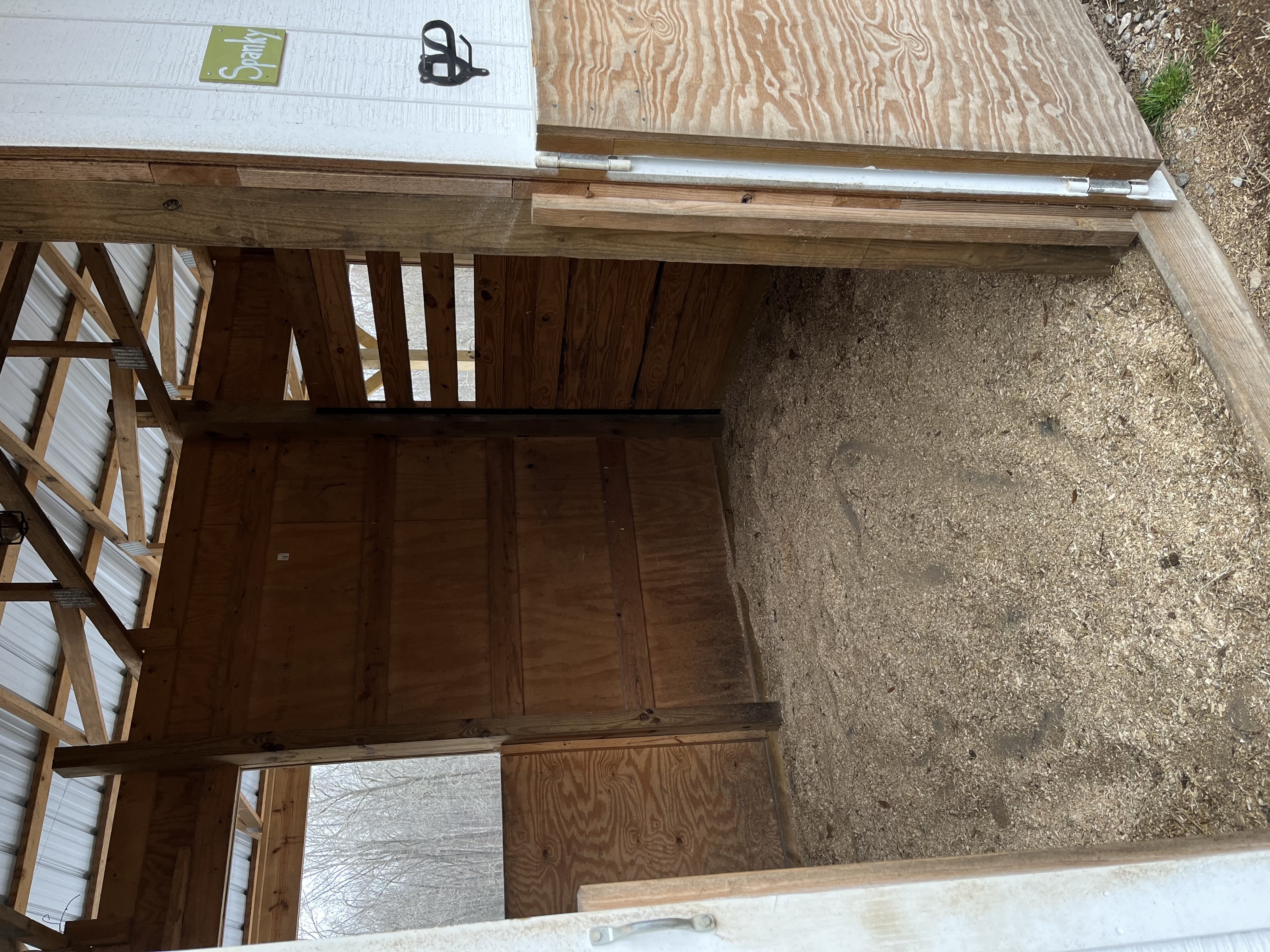
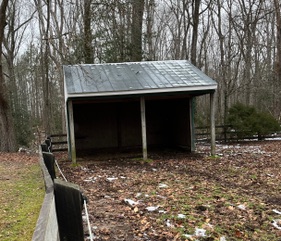
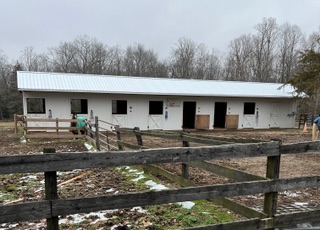


Are the organization's rules, restrictions and warnings (signage) conspicuously posted in easily accessible locations? Yes
Are the organization's emergency contacts, including veterinarian contact information, conspicuously posted in easily accessible locations? Yes
Are human and equine first aid kits easily accessible? Yes
Regarding all shelters where horses are housed including run-in sheds:
Do horses have assigned stalls in the barn/structure(s) or exclusively assigned shelter locations where they are separated from other horses with a barrier? Yes
How many hours per day, on average, are horses stalled or restricted to these sheltered exclusive shelter locations? 4-8
How often are the stalls/shelters cleaned, i.e., kept in good repair and free of standing water, accumulated waste, sharp objects and debris? 6-7 Days a Week
Do all stalls/shelters allow horses to lie down, stand up and turn around and provide protection from inclement weather (wind, sleet, rain, snow and extreme temperatures)? Yes
Are stalls/shelters kept in good repair, with adequate ceiling height, and free of standing water, accumulated waste, sharp objects and debris? Yes
Are floors constructed and maintained for both good drainage and traction? Yes
Is there a ventilation and circulation system in place to allow free flow of air to control temperature, and humidity, and to prevent air stagnation? Yes
Is wiring inaccessible to horses and maintained for safety in all areas of facility? Yes
Are fire prevention/protection measures (fire alarms, extinguishers and sprinkler systems) maintained and in good working order? Yes
Is there adequate lighting to ensure safety in all areas of facility? Yes
How many hours per day, on average, are horses turned out:
Equines are out 9 to 15 hours per day
The following describes the pastures at this facility:
This facility has a written plan in place for pasture management, which includes guidelines for seeding, fertilizing, irrigation, mowing, dragging, harrowing, manure removal, removal of debris, the control of poisonous plants, and a schedule for cleaning
A dedicated staff person(s) is responsible for pasture management
All pastures are fenced to prevent escape or injury
Fencing checks, such as broken or missing planks, loose fence posts, exposed or loose nails, detached wires, etc., are done regularly
Pastures are rotated
Pastures have natural protection for equines (i.e., trees)
Pastures have man-made protection for equines (i.e., shelters)
Not Checked:
This facility does not have pastures where equines can graze on pasture grass
Barbed wire is used for fencing
Electric fencing is used; electric wires or tape fence are visibly marked
This facility does not have pastures where equines can graze on pasture grass
Barbed wire is used for fencing
Electric fencing is used; electric wires or tape fence are visibly marked
The following describes the turnout areas other than pastures at this facility:
This facility has a written plan in place for the maintenance of turnout areas, which includes a schedule for cleaning, manure removal, and dragging
A dedicated staff person(s) is responsible for the maintenance of turnout areas
All turnout areas are fenced to prevent escape or injury
Turnout areas have man-made protection for equines (i.e., shelters)
Fencing checks, such as broken or missing planks, loose fence posts, exposed or loose nails, detached wires, etc., are done regularly
Not Checked:
This facility does not have turnout areas
Barbed wire is used for fencing
Electric fencing is used; electric wires or tape fence are visibly marked
This facility does not have turnout areas
Barbed wire is used for fencing
Electric fencing is used; electric wires or tape fence are visibly marked
The following policies and procedures are in place at the facility to restrict public access and to keep horses safe:
The property owner, staff member or caretaker lives on the premises and ensures that public access is restricted and is responsible for the security of the facility and equines
There is a mechanism in place to monitor equines overnight
No Trespassing signs are posted
Visitors are only permitted at specific times
Not Checked:
A security guard is present at night
By Appointment Only signs are posted.
Hold Harmless signs are posted
Authorized Personnel Only signs are posted
Entrance gates are locked at night
Visitors are only permitted in specific areas
The property is fitted with motion lights
The property is fitted with a security system monitored by police or a professional service
The property is fitted with a security system that is monitored internally by staff (or the property owner)
The perimeter of the property is fully fenced
A security guard is present at night
By Appointment Only signs are posted.
Hold Harmless signs are posted
Authorized Personnel Only signs are posted
Entrance gates are locked at night
Visitors are only permitted in specific areas
The property is fitted with motion lights
The property is fitted with a security system monitored by police or a professional service
The property is fitted with a security system that is monitored internally by staff (or the property owner)
The perimeter of the property is fully fenced
Equine Care/Emergency Preparedness: New Day Equine Therapy (*Main) 2026 and 2025 This section is required.
Horse Health Care/Barn Management Records: What system is used to collect and store health/horse care records?
Notebook or equivalent (technology not utilized)
The following items are consistent with our feed management plan and practices:
Equines are provided with individualized feeding plans, including supplements, according to the equine's age, breed/type, condition, size, work level and any health issues, consisting of nutritious food provided in sufficient quantity and access to adequate natural forage, or be fed daily, or as recommended by the organization's veterinarian
Feed plans are determined in consultation with a veterinarian
Supplement plans are determined in consultation with a veterinarian
Equines are fed grain in individual stalls
Staff and/or volunteers are trained in proper feed measurements and protocols and observed periodically to ensure they are feeding correctly
The feed chart is centrally located and updated as needed
The area(s) where hay, feed, grain, and supplements are stored are kept clean, free of debris and chemicals, and protected from weather and other animals in rodent-proof and mold-proof containers and grain bins
Feed, supplements and hay types are clearly labeled
Water sources, i.e., buckets, troughs, automatic waterers, etc. are kept clean, free of contaminants, debris and chemicals, protected from weather and other animals, and be positioned or affixed to minimize spillage.
Medications are kept in a secure area
Not Checked:
Equines are fed grain in groups
Equines are fed grain in groups
Is clean, potable water available at all times for all equines? Yes
Hoof Care: How often is hoof care provided for each equine? Every 4-8 weeks and when an issue arises
Dental Care: How often is dental care provided for each equine? Annually and when an issue arises
Horse checks: How often are equines visually and physically checked by personnel at the facility? Every day or 6 days a week
Our organization has the following parasite and fly/insect control protocols in place, including remedies used to control flies and insects:
Our organization follows the parasite control guidelines of our veterinarian, including fecal testing and de-worming
Fly/Insect Control Remedies:
Fly Spray Repellent
Fans
Not Checked:
The following represent the biosecurity practices in place at facility:
Our organization follows the biosecurity guidelines of our veterinarian
Sick, affected and/or quarantined equines do not have contact with other equines or other animals
Staff are trained in best practices related to biosecurity
Volunteers are trained in best practices related to biosecurity
A specific individual is trained and assigned to care for sick, affected and/or quarantined equines
Sick, affected and/or quarantined equines are cared for last if the caretaker must also care for healthy equines
Restricted access signs are posted at primary points of access to sick, affected and/or quarantined equines
Hand sanitizers are available at all primary points of access to sick, affected and/or quarantined equines
Footbaths are available at all primary points of access to sick, affected and/or quarantined equines
Manure and bedding from sick, affected and/or quarantined equines is removed from the facility - not put in open air piles, and not spread on pastures
Quarantine areas, such as stalls, aisle ways, paddocks, and common areas, are cleaned (and needed, disinfected) after conclusion of the quarantine.
Trailers/vans used by sick, affected and/or quarantined equines are cleaned and disinfected after each use and cleaning takes place away from where equines are sheltered
Equipment used by sick, affected and/or quarantined equines is not shared
Equipment used by sick, affected and/or quarantined equines is cleaned of organic debris and disinfected after each use
Latex gloves, or equivalent gloves, are worn when working with sick, affected and/or quarantined equines
Not Checked:
The organization has a written biosecurity plan
Equines are not quarantined on arrival.
The organization has a written biosecurity plan
Equines are not quarantined on arrival.
The following represent the manure removal practices in place at facility:
Manure is piled in an area where equines are not located
Manure is hauled, sold or given away
Our organization adheres to the manure management guidelines set by the state, local authorities, and/or our organization's veterinarian
Not Checked:
Manure is stored in dumpster(s)
Manure piles are covered
Manure piles are composted or spread on pastures
Manure is stored in dumpster(s)
Manure piles are covered
Manure piles are composted or spread on pastures
The following steps are taken to help staff and volunteers readily identify each horse on the property:
Equines are assigned the same exclusive stall/shelter location each day
Name plates are located on the stall/shelter location
A map/diagram is posted showing the location of each equine with equine names and photos
Staff and volunteers are provided with an information packet with equine profiles, including photos and detailed descriptions
Staff/volunteers are provided training on conformation, markings, colors, and breeds
Team leaders work with new staff/volunteers until they are able to identify the equines
Not Checked:
Photos are located on the stall/shelter location
Equines wear halters with nametags
A notebook or binder with photos and information on each equine is easily accessible
Equine photos and profiles are available on the website
Photos are located on the stall/shelter location
Equines wear halters with nametags
A notebook or binder with photos and information on each equine is easily accessible
Equine photos and profiles are available on the website
Our organization has the following policies and procedures in place pertaining to tack, apparel and equipment:
Saddles are shared
Saddle pads are shared
Blankets, sheets and turn out apparel are fitted and utilized for each equine appropriate to the equine's needs and the weather conditions
Blankets, sheets and turn out apparel are cleaned regularly as needed
Riding Tack is always cleaned after each use
Riding Tack is inspected for overall working condition before each use by trained personnel
Riding Tack is assessed for fit before each use by trained personnel
Riding Tack is assessed for fit by trained personnel when an equine's body condition changes
Riding Tack is assessed for fit by trained personnel when an equine's disposition changes
Assigned riding tack is clearly labeled
Riding Tack is stored in a climate-controlled location
Helmets are shared
Helmets are cleaned/disinfected after each use
Helmets are replaced after a fall
Helmets are replaced at least every five years.
Not Checked:
All equines have specifically assigned apparel, equipment and tack (saddles/bridles if ridden) that is not shared
Bridles are shared
Bits are shared
Blankets are shared
Sheets are shared
Turnout apparel is shared
Halters are shared
Riding Tack is always cleaned at least weekly
Riding Tack is cleaned only when needed
This facility enlists the services of a professional saddle fitter at least once a year
No equines are ridden; saddles, bridles, etc. not applicable.
All equines have specifically assigned apparel, equipment and tack (saddles/bridles if ridden) that is not shared
Bridles are shared
Bits are shared
Blankets are shared
Sheets are shared
Turnout apparel is shared
Halters are shared
Riding Tack is always cleaned at least weekly
Riding Tack is cleaned only when needed
This facility enlists the services of a professional saddle fitter at least once a year
No equines are ridden; saddles, bridles, etc. not applicable.
Emergency Preparedness: New Day Equine Therapy: *Main This section is required.
The following plans, policies, and procedures are in place at the facility to handle emergencies and address weather related issues, fire safety procedures, and/or any additional hazardous scenarios the facility could potentially experience:
Emergency procedures are posted prominently
The facility owns or has access to a generator
The facility maintains at least two weeks of hay, feed, shavings and medications
The facility collects and maintains medical information from staff, volunteers, and clients
The facility maintains appropriate liability and/or workers' compensation insurance
The organization has a written emergency preparedness/safety plan (EPP)
Not Checked:
The written EPP addresses the following areas: Local fire department and/or the state's emergency planning department procedures
Medical emergencies for clients, staff, and volunteers
Medical emergencies for equines
Evacuation plans
Power outages
Fire
Natural Disasters - thunderstorm, hurricanes, earthquakes, tornados, etc
Terrorist attacks
Protocols to notify emergency personnel
Building/facility exit plans
Not Checked:
The facility follows the specific procedures to help PREVENT emergency situations:
Smoking is strictly prohibited
NO SMOKING signs are posted prominently
Hay is stored away from permanent or temporary structures where equines are stalled
Permanent or temporary structures where equines are stalled are kept free of dust, cobwebs, trash, cleaning rags, and other flammable items
Aisles and doorways are kept clear
Not Checked:
Heaters with automatic shutoff settings are used
Heaters with automatic shutoff settings are used
How often are the following checked or performed?
Fire Extinguishers are checked: Annually
Smoke detectors are checked: Not at all/NA
Fence lines are checked: Monthly
Turnout Areas are checked: Daily
Sprinkler systems are checked: Not at all/NA
Fire drills are conducted: Not at all/NA
Review of safety protocols with staff are conducted: Monthly
Review of safety protocols with volunteers are conducted: Quarterly
The Emergency Preparedness Plan is reviewed and updated: Quarterly
Equine Transportation: 2= Onsite: 1 (1 + 0) + Offsite: 1
2-horse van/trailer with truck:
1 Access offsite;
4-horse van/trailer with truck:
1 Owned onsite